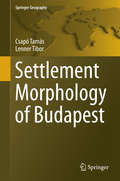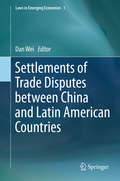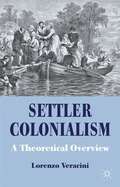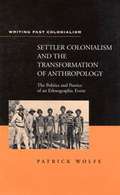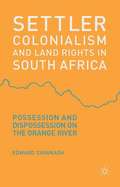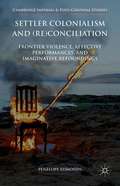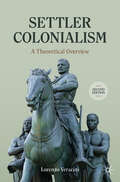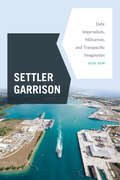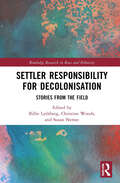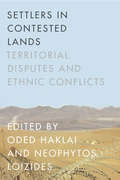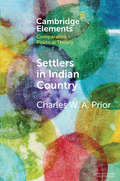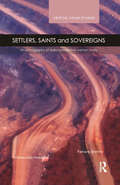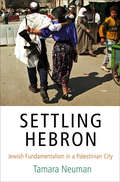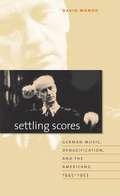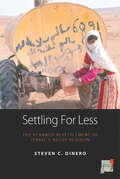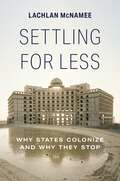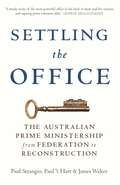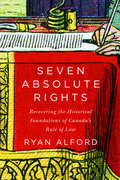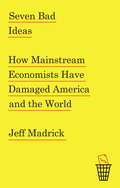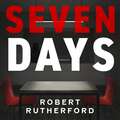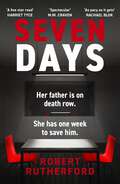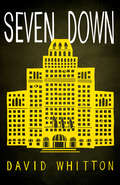- Table View
- List View
Settlement Morphology of Budapest
by Csapó Tamás Lenner TiborThis book presents the results of empirical research conducted by the authors, who personally surveyed the people they met on each and every street, square and public space in Budapest. It has four extensive chapters that discuss urban change and structure in Budapest and feature many rich color illustrations. The first chapter looks at the geographical circumstances impacting the city's urban development in a historical context, as well as the evolution of its functions and demographic processes and the development of the ground plan and settlement structure. The second chapter concerns itself with the way the capital city of Hungary is built, demonstrating the horizontal homogeneity and vertical heterogeneity of development together with development types and locations in Budapest. The third chapter was written about the change in Budapest's urban structure, especially in regard to the years after 1990. It lists the major factors influencing urban structure transformation, followed by a detailed analysis of Budapest's functional zones. Lastly, the fourth chapter provides a detailed introduction to each capital city district, including their creation, development and functional structures.
Settlements of Trade Disputes between China and Latin American Countries
by Dan WeiPresenting a wealth of highly original and innovative analyses and case studies, this book examines the strategic ties between various emerging economies, their different approaches to finding mutual trade solutions, and new trends in the use of contingent protection. The research methodology can also be applied to the study of specific Latin American countries or other developed or developing states in comparison to China. The book presents new theories and offers a valuable template for further studies in this area. Further, the application of the New Haven approach can further develop the studies' potential to offer guidance in a broader context.
Settler Colonialism
by Lorenzo VeraciniA vivid exploration of the history of a very powerful and long lasting idea: building European worlds outside of Europe. Veracini outlines how the founding of new societies was envisaged and practiced and explores the specific ways in which settler colonial projects tried to establish ideal and regenerated political bodies.
Settler Colonialism And The Transformation Of Anthropology: The Politics And Poetics Of An Ethnographic Event (Writing Past Colonialism)
by Patrick WolfeThis work analyzes the politics of anthropological knowledge from critical perspective that alters existing understandings of colonialism. At the same time, it produces insights into the history of anthropology. Organized around an historical reconstruction of the great anthropological controversy over doctrines of virgin birth, the book argues that the allegation a great deal about European colonial discourse and little if anything about indigenous beliefs. By means of an Australian example, the book shows not only that the alleged ignorance was an artifact of the anthropological theory that produced it, but also that the anthropology was an artifact of the anthropological theory that produced it, but also that the anthropology concerned has been closely tied into both the historical dispossession and the continuing oppression of native peoples. The author explores the links between metropolitan anthropological theory and local colonial politics from the 19th century up to the present, settler colonialism, and the ideological and sexual regimes that characterize it.
Settler Colonialism and Land Rights in South Africa
by Edward CavanaghThis local history of Griqua Philippolis (1824-1862) and Afrikaner Orania (1990-2013) gets at the crux of the ever-pertinent land question in South Africa. Identifying the many layers of dispossession definitive of the South African past, the book presents a provocative new argument about land rights and the residues of settler colonialism.
Settler Colonialism and: Frontier Violence, Affective Performances, and Imaginative Refoundings (Cambridge Imperial and Post-Colonial Studies)
by Penelope EdmondsThis book examines the performative life reconciliation and its discontents in settler societies. It explores the refoundings of the settler state and reimaginings of its alternatives, as well as the way the past is mobilized and reworked in the name of social transformation within a new global paradigm of reconciliation and the 'age of apology'.
Settler Colonialism: A Theoretical Overview (Cambridge Imperial and Post-Colonial Studies)
by Lorenzo VeraciniExploring the history and politics of a powerful and long-lasting idea: the creation and maintenance of European worlds outside of Europe. This textbook provides a broad overview of settler colonialism in the modern era. The author outlines how the founding of new societies was envisaged and practiced around the world, illustrating the specific ways in which settler colonial projects tried to establish ideal and regenerated political bodies. With an updated introduction and an additional chapter examining decolonisation and Indigenous recognition, this second edition brings the study of settler colonialism up to the present day.
Settler Garrison: Debt Imperialism, Militarism, and Transpacific Imaginaries
by Jodi KimIn Settler Garrison Jodi Kim theorizes how the United States extends its sovereignty across Asia and the Pacific in the post-World War II era through a militarist settler imperialism that is leveraged on debt as a manifold economic and cultural relation undergirded by asymmetries of power. Kim demonstrates that despite being the largest debtor nation in the world, the United States positions itself as an imperial creditor that imposes financial and affective indebtedness alongside a disciplinary payback temporality even as it evades repayment of its own debts. This debt imperialism is violently reproduced in juridically ambiguous spaces Kim calls the “settler garrison”: a colonial archipelago of distinct yet linked military camptowns, bases, POW camps, and unincorporated territories situated across the Pacific from South Korea to Okinawa to Guam. Kim reveals this process through an analysis of how a wide array of transpacific cultural productions creates antimilitarist and decolonial imaginaries that diagnose US militarist settler imperialism while envisioning alternatives to it.
Settler Responsibility for Decolonisation: Stories from the Field (Routledge Research in Race and Ethnicity)
by Billie Lythberg Susan Nemec Christine WoodsThis edited collection presents perspectives from a range of disciplines on the challenges of dismantling coloniality in settler societies. Showcasing a variety of pedagogies and case studies, the book offers approaches to the praxis of decolonisation in diverse settings including tertiary education, activism, arts curatorial practice, the media, trans-Indigeneity, and psychosocial therapy. Chapters centre on the personal, relational, and political work needed to support decolonisation in settler societies in Aotearoa New Zealand, Australia, the United States, and Canada. Drawing from experiences in the field, contributors argue that to decolonise research and build authentic relationships with Indigenous communities, settler researchers must learn from Indigenous worldviews without appropriating them, disrupt colonial epistemologies, and reconcile their place in colonialism. Indigenising is discussed as a counterpart to the decolonisation process, involving restoring and centring the Indigenous voice within Indigenised socio-cultural, economic, legal, and political structures and institutions, including the return of land. The book is a rich resource for researchers seeking to understand and support decolonisation in settler societies, and will appeal to non-Indigenous scholars, students, and those involved in decolonisation work in community and institutional settings.
Settlers in Contested Lands: Territorial Disputes and Ethnic Conflicts
by Neophytos Loizides Oded HaklaiSettlers feature in many protracted territorial disputes and ethnic conflicts around the world. Explaining the dynamics of the politics of settlers in contested territories in several contemporary cases, this book illuminates how settler-related conflicts emerge, evolve, and are significantly more difficult to resolve than other disputes. Written by country experts, chapters consider Israel and the West Bank, Arab settlers in Kirkuk, Moroccan settlers in Western Sahara, settlers from Fascist Italy in North Africa, Turkish settlers in Cyprus, Indonesian settlers in East Timor, and Sinhalese settlers in Sri Lanka. Addressing four common topics--right-sizing the state, mobilization and violence, the framing process, and legal principles versus pragmatism--the cases taken together raise interrelated questions about the role of settlers in conflicts in contested territory. Then looking beyond the similar characteristics, these cases also illuminate key differences in levels of settler mobilization and the impact these differences can have on peace processes to help explain different outcomes of settler-related conflicts. Finally, cases investigate the causes of settler mobilization and identify relevant conflict resolution mechanisms.
Settlers in Indian Country: Sovereignty and Indigenous Power in Early America (Elements in Comparative Political Theory)
by Charles W. PriorThe aim of this Element is to foreground Native American conceptions of sovereignty and power in order to refine the place of settler colonialism in American colonial and early republican history. It argues that Indigenous concepts of sovereignty were rooted in complex metaphorical language, in historical understandings of alliance, and in mobility in a landscape of layered interconnections of power. Where some versions of the interpretive paradigm of settler colonialism emphasise the violent 'elimination of the native', this work reveals that diplomatic transactions between the Iroquois Confederacy and British colonial and imperial agents reveal a hybrid language of alliance, sovereignty and territory. These languages and concepts of inter-cultural diplomacy provide contexts that suggest a more nuanced and dynamic relationship between colonialism and Indigenous power.
Settlers, Saints and Sovereigns: An Ethnography of State Formation in Western India (Critical Asian Studies)
by Farhana IbrahimThis book is an anthropological study located along India’s western border with Pakistan. The core arguments are situated within the context of contemporary religious nationalism, communal strife, and border politics in the Indian state of Gujarat. It seeks to understand how, within these contexts, a region becomes a meaningful place for its inhabitants and how different peoples relate to locality through time. Theoretically, the book builds on available anthropological literatures on state formation and border politics to interrogate the presumed impermeability of nationalist discourse and territorial boundaries.
Settling Hebron: Jewish Fundamentalism in a Palestinian City (The Ethnography of Political Violence)
by Tamara NeumanThe city of Hebron is important to Jewish, Islamic, and Christian traditions as home to the Tomb of the Patriarchs, the burial site of three biblical couples: Abraham and Sarah, Isaac and Rebecca, and Jacob and Leah. Today, Hebron is one of the epicenters of the Israel-Palestine conflict, consisting of two unequal populations: a traditional Palestinian majority without citizenship, and a fundamentalist Jewish settler minority with full legal rights. Contemporary Jewish settler practices and sensibilities, legal gray zones, and ruling complicities have remade Hebron into a divided Palestinian city surrounded by a landscape of fragmented, militarized strongholds.In Settling Hebron, Tamara Neuman examines how religion functions as ideology in Hebron, with a focus on Jewish settler expansion and its close but ambivalent relationship to the Israeli state. Neuman presents the first critical ethnography of the Jewish settler populations in Kiryat Arba and the adjacent Jewish Quarter in the Old City of Hebron,considered by many Israelis as the most "ideological" of settlements. Through extensive fieldwork, interviews with settlers, soldiers, displaced Palestinian urban residents and farmers as well as archival research, Neuman challenges dismissive portraits of settlers as rigid, fanatical adherents of an anachronistic worldview. At the same time, she reveals the extent of disconnection between these settler communities and mainstream Modern Orthodox Judaism, both of which interpret written sources on the sacredness of land—biblical texts, rabbinic commentary, and mystical traditions—in radically different ways. Neuman also traces the violent results of a settler formation, Palestinian responses to settler encroachment, and the connection between ideological settlement and economic processes. Settling Hebron explores the complexity of Hebron's Jewish settler community in its own right—through its routine practices and rituals, its most extreme instances of fundamentalist revision and violence, and its strategic relationships with successive Israeli governments.
Settling Nature: The Conservation Regime in Palestine-Israel
by Irus BravermanA study of Palestine-Israel through the unexpected lens of nature conservation Settling Nature documents the widespread ecological warfare practiced by the state of Israel. Recruited to the front lines are fallow deer, gazelles, wild asses, griffon vultures, pine trees, and cows—on the Israeli side—against goats, camels, olive trees, hybrid goldfinches, and akkoub—which are affiliated with the Palestinian side. These nonhuman soldiers are all the more effective because nature camouflages their tactical deployment as such.Drawing on more than seventy interviews with Israel&’s nature officials and on observations of their work, this book examines the careful orchestration of this animated warfare by Israel&’s nature administration on both sides of the Green Line. Alongside its powerful protection of wildlife biodiversity, the territorial reach of Israel&’s nature protection is remarkable: to date, nearly 25 percent of the country&’s total land mass is assigned as a park or a reserve. Settling Nature argues that the administration of nature advances the Zionist project of Jewish settlement and the corresponding dispossession of non-Jews from this space.
Settling Scores
by David MonodClassical music was central to German national identity in the early twentieth century. The preeminence of composers such as Bach and Beethoven and artists such as conductor Wilhelm Furtwangler and pianist Walter Gieseking was cited by the Nazis as justification for German expansionism and as evidence of Aryan superiority. In the minds of many Americans, further German aggression could be prevented only if the population's faith in its moral and cultural superiority was shattered. In Settling Scores, David Monod examines the attempted "denazification" of the German music world by the Music Control Branch of the Information Control Division of Military Government. The occupying American forces barred from the stage and concert hall all former Nazi Party members and even anyone deemed to display an "authoritarian personality." They also imported European and American music. These actions, however, divided American officials and outraged German audiences and performers. Nonetheless, the long-term effects were greater than has been previously recognized, as German government officials regained local control and voluntarily limited their involvement in artistic life while promoting "new" (anti-Nazi) music.
Settling for Less: The Planned Resettlement of Israel's Negev Bedouin (Space and Place #3)
by Steven C. DineroThe resettlement of the Negev Bedouin (Israel) has been wrought with controversy since its inception in the 1960s. Presenting evidence from a two-decade period, the author addresses how the changes that took place over the past sixty to seventy years have served the needs and interests of the State rather than those of Bedouin community at large. While town living fostered improvements in social and economic development, numerous unintended consequences jeopardized the success of this planning initiative. As a result, the Bedouin community endured excessive hardship and rapid change, abandoning its nomadic lifestyle and traditions in response to the economic, political, and social pressure from the State—and received very little in return.
Settling for Less: Why States Colonize and Why They Stop
by Lachlan McNameeWhy countries colonize the lands of indigenous people Over the past few centuries, vast areas of the world have been violently colonized by settlers. But why did states like Australia and the United States stop settling frontier lands during the twentieth century? At the same time, why did states loudly committed to decolonization like Indonesia and China start settling the lands of such minorities as the West Papuans and Uyghurs? Settling for Less traces this bewildering historical reversal, explaining when and why indigenous peoples suffer displacement at the hands of settlers.Lachlan McNamee challenges the notion that settler colonialism can be explained by economics or racial ideologies. He tells a more complex story about state building and the conflicts of interest between indigenous peoples, states, and settlers. Drawing from a rich array of historical evidence, McNamee shows that states generally colonize frontier areas in response to security concerns. Elite schemes to populate contested frontiers with loyal settlers, however, often fail. As societies grow wealthier and cities increasingly become magnets for migration, states ultimately lose the power to settle frontier lands.Settling for Less uncovers the internal dynamics of settler colonialism and the diminishing power of colonizers in a rapidly urbanizing world. Contrasting successful and failed colonization projects in Australia, Indonesia, China, and beyond, this book demonstrates that economic development—by thwarting colonization—has proven a powerful force for indigenous self-determination.
Settling the Office: The Australian Prime Ministership from Federation to Reconstruction
by Paul 't Hart James Walter Paul StrangioThe prime ministership is indisputably the most closely observed and keenly contested office in Australia. How did it grow to become the pivot of national political power? Settling the Office chronicles the development of the prime ministership from its rudimentary early days following Federation through to the powerful, institutionalised prime-ministerial leadership of the postwar era.
Seven Absolute Rights: Recovering the Historical Foundations of Canada's Rule of Law
by Ryan AlfordFor 150 years, Canada's constitutional order has been both flexible and durable, ensuring peace, order, and good government while protecting the absolute rights at the core of the rule of law. In this era of transnational terrorism and proliferating emergency powers, it is essential to revisit how and why our constitutional order developed particular limits on the government's powers, which remain in force despite war, rebellion, and insurrection. Seven Absolute Rights surveys the historical foundations of Canada's rule of law and the ways they reinforce the Constitution. Ryan Alford provides a gripping narrative of constitutional history, beginning with the medieval and early modern context of Magna Carta, the Petition of Right, and the constitutional settlement of the Glorious Revolution. <P><P>His reconstruction ends with a detailed examination of two pre-Confederation crises: the rebellions of 1837–38 and the riots of 1849, which, as he demonstrates, provide the missing constitutionalist context to the framing of the British North America Act. Through this accessible exploration of key events and legal precedents, Alford offers a distinct perspective on the substantive principles of the rule of law embedded in Canada's Constitution. In bringing constitutional history to life, Seven Absolute Rights reveals the history and meaning of these long-forgotten protections and shows why they remain fundamental to our freedom in the twenty-first century.
Seven Absolute Rights: Recovering the Historical Foundations of Canada's Rule of Law
by Ryan AlfordFor 150 years, Canada's constitutional order has been both flexible and durable, ensuring peace, order, and good government while protecting the absolute rights at the core of the rule of law. In this era of transnational terrorism and proliferating emergency powers, it is essential to revisit how and why our constitutional order developed particular limits on the government's powers, which remain in force despite war, rebellion, and insurrection. Seven Absolute Rights surveys the historical foundations of Canada's rule of law and the ways they reinforce the Constitution. Ryan Alford provides a gripping narrative of constitutional history, beginning with the medieval and early modern context of Magna Carta, the Petition of Right, and the constitutional settlement of the Glorious Revolution. His reconstruction ends with a detailed examination of two pre-Confederation crises: the rebellions of 1837–38 and the riots of 1849, which, as he demonstrates, provide the missing constitutionalist context to the framing of the British North America Act. Through this accessible exploration of key events and legal precedents, Alford offers a distinct perspective on the substantive principles of the rule of law embedded in Canada's Constitution. In bringing constitutional history to life, Seven Absolute Rights reveals the history and meaning of these long-forgotten protections and shows why they remain fundamental to our freedom in the twenty-first century.
Seven Bad Ideas
by Jeff MadrickA bold indictment of some of our most accepted mainstream economic theories--why they're wrong, and how they've been harming America and the world. Budget deficits are bad. A strong dollar is good. Controlling inflation is paramount. Pay reflects greater worker skills. A deregulated free market is fair and effective. Theories like these have become mantras among American economists both liberal and conservative over recent decades. Validated originally by patron saints like Milton Friedman, they've assumed the status of self-evident truths across much of the mainstream. Jeff Madrick, former columnist for The New York Times and Harper's, argues compellingly that a reconsideration is long overdue. Since the financial turmoil of the 1970s made stagnating wages and relatively high unemployment the norm, Madrick argues, many leading economists have retrenched to the classical (and outdated) bulwarks of theory, drawing their ideas more from purist principles than from the real-world behavior of governments and markets--while, ironically, deeply affecting those governments and markets by their counsel. Madrick atomizes seven of the greatest false idols of modern economic theory, illustrating how these ideas have been damaging markets, infrastructure, and individual livelihoods for years, causing hundreds of billions of dollars of wasted investment, financial crisis after financial crisis, poor and unequal public education, primitive public transportation, gross inequality of income and wealth and stagnating wages, and uncontrolled military spending. Using the Great Recession as his foremost case study, Madrick shows how the decisions America should have made before, during, and after the financial crisis were suppressed by wrongheaded but popular theory, and how the consequences are still disadvantaging working America and undermining the foundations of global commerce. Madrick spares no sinners as he reveals how the "Friedman doctrine" has undermined the meaning of citizenship and community, how the "Great Moderation" became a great jobs emergency, and how economists were so concerned with getting the incentives right for Wall Street that they got financial regulation all wrong. He in turn examines the too-often-marginalized good ideas of modern economics and convincingly argues just how beneficial they could be--if they can gain traction among policy makers. Trenchant, sweeping, and empirical, Seven Bad Ideas resoundingly disrupts the status quo of modern economic theory.From the Hardcover edition.
Seven Days: a gripping, high-octane crime thriller for 2024 - can Alice save her father from death row?
by Robert Rutherford'Wow! An absolutely fantastic edge of your seat thriller. I could not turn the pages fast enough... Would be an amazing film or tv series. The ending was perfect... Highly recommended' Reader review⭐⭐⭐⭐⭐Your father is on death row. You have seven days to save him. But do you want to?Alice knows her father is guilty of many things. He's guilty of abandoning her.He's guilty of being unfaithful to her mother.But is he guilty of murder?Now on Death Row, he has seven days to live.Some people want him released.Others will kill to keep him just where he is.Alice has only one chance to save him. But should she?Readers are loving Seven Days:'This was wild! Really enjoyed this. Good characters, good story line and it kept me guessing' Reader review⭐⭐⭐⭐⭐'Compulsive and page turning read... lots of surprises' Reader review⭐⭐⭐⭐⭐'A dark and atmospheric thriller that explores the complexities of family, trauma, and life, with a shocking ending, fantastic novel'⭐⭐⭐⭐⭐'Twisty, tense and superbly characterised, this global race against time and across the world is a top read'⭐⭐⭐⭐⭐'Kept me hooked from start to finish!'⭐⭐⭐⭐⭐'A high-octane, high-stakes thriller about family dynamics, guilt and responsibility'⭐⭐⭐⭐⭐
Seven Days: the instant Sunday Times bestseller: a gripping, high-octane crime thriller for 2024 - can Alice save her father from death row?
by Robert Rutherford'Wow! An absolutely fantastic edge of your seat thriller. I could not turn the pages fast enough... Would be an amazing film or tv series. The ending was perfect... Highly recommended' Reader review⭐⭐⭐⭐⭐Your father is on death row. You have seven days to save him. But do you want to?Alice knows her father is guilty of many things. He's guilty of abandoning her.He's guilty of being unfaithful to her mother.But is he guilty of murder?Now on Death Row, he has seven days to live.Some people want him released.Others will kill to keep him just where he is.Alice has only one chance to save him. But should she?Readers are loving Seven Days:'This was wild! Really enjoyed this. Good characters, good story line and it kept me guessing' Reader review⭐⭐⭐⭐⭐'Compulsive and page turning read... lots of surprises' Reader review⭐⭐⭐⭐⭐'A dark and atmospheric thriller that explores the complexities of family, trauma, and life, with a shocking ending, fantastic novel'⭐⭐⭐⭐⭐'Twisty, tense and superbly characterised, this global race against time and across the world is a top read'⭐⭐⭐⭐⭐'Kept me hooked from start to finish!'⭐⭐⭐⭐⭐'A high-octane, high-stakes thriller about family dynamics, guilt and responsibility'⭐⭐⭐⭐⭐
Seven Days: the instant Sunday Times bestseller: a gripping, high-octane crime thriller for 2024 - can Alice save her father from death row?
by Robert Rutherford'Wow! An absolutely fantastic edge of your seat thriller. I could not turn the pages fast enough... Would be an amazing film or tv series. The ending was perfect... Highly recommended' Reader review⭐⭐⭐⭐⭐Your father is on death row. You have seven days to save him. But do you want to?Alice knows her father is guilty of many things. He's guilty of abandoning her.He's guilty of being unfaithful to her mother.But is he guilty of murder?Now on Death Row, he has seven days to live.Some people want him released.Others will kill to keep him just where he is.Alice has only one chance to save him. But should she?Readers are loving Seven Days:'This was wild! Really enjoyed this. Good characters, good story line and it kept me guessing' Reader review⭐⭐⭐⭐⭐'Compulsive and page turning read... lots of surprises' Reader review⭐⭐⭐⭐⭐'A dark and atmospheric thriller that explores the complexities of family, trauma, and life, with a shocking ending, fantastic novel'⭐⭐⭐⭐⭐'Twisty, tense and superbly characterised, this global race against time and across the world is a top read'⭐⭐⭐⭐⭐'Kept me hooked from start to finish!'⭐⭐⭐⭐⭐'A high-octane, high-stakes thriller about family dynamics, guilt and responsibility'⭐⭐⭐⭐⭐
Seven Down
by David WhittonIn this quirky, character-driven debut novel seven hotel employees puzzle out the events of a botched assassination attempt — the next read for fans of Fredrik Backman (Anxious People) and Matt Haig (The Midnight Library). Seven ordinary hotel employees. Catering, Reservations, Management. Seven moles, waiting for years for a single code word, a trigger that will send them into action in a violent event that will end their dull lives as they know them. The event has failed: the action was a disaster. Each employee is being debriefed by an agent of an invisible organization. These are the transcripts of these interviews. What they reveal is not just the intricate mechanism of an international assassination, but the yearnings inside each of its pawns, the desperation and secret rage that might cause any one of us to sign up, sell out, and take a plunge into darkness. Both sinister and absurd, Seven Down is a puzzle to be solved, a comedy, and a panorama of life. At once sociological, satirical, and scary, it paints portraits of the mundane human failings behind geopolitical machinations.A RARE MACHINES BOOK
